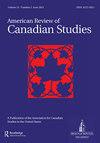Walking the Decolonization Talk: Reckoning with the Past and Wrestling with the Present to Reimagine the Future of Social Work Education in Nunavik
IF 0.4
Q3 AREA STUDIES
引用次数: 0
Abstract
ABSTRACT The Truth and Reconciliation Commission of Canada calls for closing education gaps between non-Indigenous and Indigenous Canadians as part of the real work of reconciliation, that is, walking the decolonization talk. In Nunavik, a part of Inuit Nunangat, addressing these education gaps is complex, requiring trust building between educational institutions and Inuit communities. In Nunavik’s 14 communities, there are only two Inuit who hold Bachelor of Social Work degrees. Establishing or rebuilding trust is extraordinarily difficult given ongoing colonial policies and institutional structures that disregard Inuit experience. This article describes the journey of developing a Bachelor of Social Work degree program in Kuujjuaq, Nunavik, to be called Inulirijiit, in the context of the history of social welfare for Nunavimmiut and how Canada’s Truth and Reconciliation Commission (2008–2015) and the Public Inquiry Commission on Relations between Indigenous Peoples and Certain Public Services in Québec (Viens Commission, 2019) have shaped contemporary social work education and practice. We argue that the Bachelor of Social Work degree program must have at its center Inuit ways of knowing, learning, teaching, and being.行走在非殖民化的对话中:与过去抗争重塑努纳维克社会工作教育的未来
摘要加拿大真相与和解委员会呼吁缩小非土著和土著加拿大人之间的教育差距,这是真正的和解工作的一部分,也就是走非殖民化之路。在努纳维克,作为因纽特人努南加特的一部分,解决这些教育差距是复杂的,需要在教育机构和因纽特人社区之间建立信任。在努纳维克的14个社区中,只有两个因纽特人拥有社会工作学士学位。鉴于持续的殖民政策和无视因纽特人经验的体制结构,建立或重建信任异常困难。本文描述了在努纳维克的Kuujjuaq开发一个名为Inulirijiit的社会工作学士学位项目的历程,在Nunavimmiut社会福利历史的背景下,以及加拿大真相与和解委员会(2008-2015)和魁北克土著人民与某些公共服务关系公共调查委员会(Viens委员会,2019)如何塑造当代社会工作教育和实践。我们认为,社会工作学士学位课程必须以因纽特人的认识、学习、教学和存在方式为中心。
本文章由计算机程序翻译,如有差异,请以英文原文为准。
求助全文
约1分钟内获得全文
求助全文
来源期刊

American Review of Canadian Studies
AREA STUDIES-
CiteScore
0.60
自引率
0.00%
发文量
25
期刊介绍:
American Nineteenth Century History is a peer-reviewed, transatlantic journal devoted to the history of the United States during the long nineteenth century. It welcomes contributions on themes and topics relating to America in this period: slavery, race and ethnicity, the Civil War and Reconstruction, military history, American nationalism, urban history, immigration and ethnicity, western history, the history of women, gender studies, African Americans and Native Americans, cultural studies and comparative pieces. In addition to articles based on original research, historiographical pieces, reassessments of historical controversies, and reappraisals of prominent events or individuals are welcome. Special issues devoted to a particular theme or topic will also be considered.
 求助内容:
求助内容: 应助结果提醒方式:
应助结果提醒方式:


